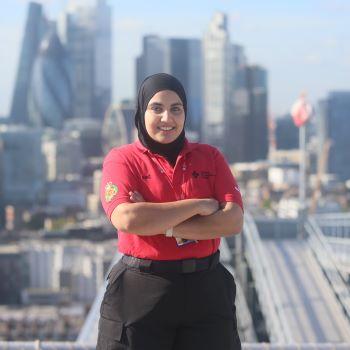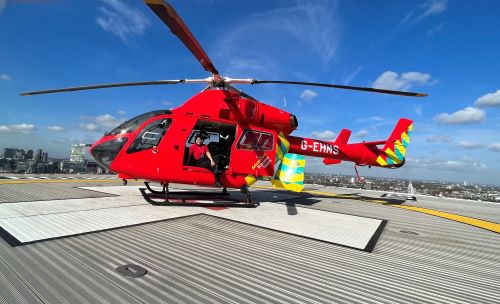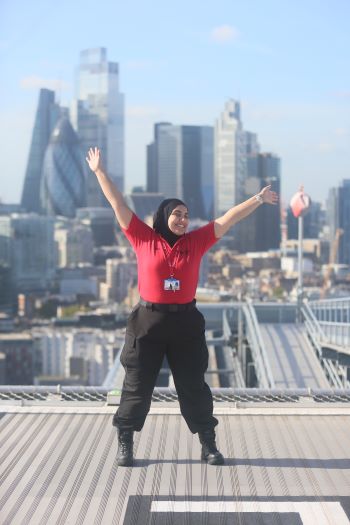29 Mar 2023

To mark Ramadan Mubarak, we spoke to London’s Air Ambulance’s Air Ambulance Clinician, Aisha, who gave us an insight into what the 30 days of patience means to her.
What is your role for London's Air Ambulance?
I am an Emergency Ambulance Crew member with London Ambulance Service (LAS), which means I work as a clinician supporting the doctor. I am also currently seconded to London’s Air Ambulance for 12 months as an Ambulance Clinician, which began in September, and am working in the rapid response cars.
Working with London’s Air Ambulance is a very different role in comparison to a road ambulance crew member. It is a lot more challenging and a lot more thought provoking. It is challenging me to be more confident in my skills.
There are also things London's Air Ambulance can do that you cannot do from an ambulance.
I am learning a lot and will definitely take and use this knowledge within my LAS role.
What kind of shift hours do you tend to work?
Normally I work 10 hour shifts, for four to five days in a row. Then you get a few days off.
We have three rapid response unit shifts, one from 08:00, one from 10.30 and one from 13:00 into the evening. We are a critical care resource like the helicopter, trained to the same standards and capable of the same procedures, like intubating and sedating in a pre-hospital environment.
For our non-Islamic community can you tell us what Ramadan is?
Ramadan is 30 days of patience. It is the Muslim’s training ground for the next year. We try to cut off bad habits, adopt good habits and concentrate on being a better human being. It is a time to reflect on what we want and how we can benefit our community, grounding ourselves and reconnecting with God, family and friends.
In my job you spend months working, so Ramadan gives me 30 days of semi isolating myself, concentrating on myself and my mental health. Feeling reconnected to God recentres me and gives me space for growth in the next year.
During Ramadan we fast for 30 days. The elderly, generally unwell people, pregnant women, children, individuals with dementia and females on their periods are exempt from fasting. You only do it if you are in a fit state to do it.
At sunrise is the first and only meal – The Morning Meal. Then you participate in Fajr – the Morning Prayer, and then the fast begins for the day. You fast the whole day with no food or water then open your fast at the end of the day at sunset.
We also fast from television, distractions and music, and from anger (for example road rage).
It is a time for reflection. Most the time is spent at home helping family, in the community, in the Mosques, or volunteering. During Ramadan, I go with my Scouts Group on a rubbish clean up.
Focusing on what I do that can be a betterment of my time and energy, and will have the most positive impact to myself and my community, ties in very well with my job with London's Air Ambulance - we are always striving to help people.
To what extent is it difficult to fast for hours, especially with others eating around you?
The challenging thing is not fasting from food or drink, as most of us have been doing this from the age of puberty and are used to it. We are used to feeling the hunger. We know we are fasting but we get to eat at the end of the day, other people may have that hunger but no meal at the end.
The challenge is feeling tired and fatigued. You can get a headache and you may work at a slower pace than normal. It is good to eat well at your morning meal, so you can fast and function well.
If my colleagues eat in front of me that is absolutely fine, I don’t feel hungry. It is very normal for Muslims as they have practiced this since they are children.

What time of year does Ramadan fall in?
Ramadan depends on the lining of the moon and the Islamic calendar and it shifts every year. It is now going backwards towards the winter months, whereas when I was in school it was during the summer holidays. If Ramadan falls in winter months it is a shorter fast, summer is longer.
We time everything with the sighting of the moon. In Saudi Arabia before festivals like Eid they would sit out in the desert with a telescope to know this particular time has come. So our festivals change and fluctuate.
How difficult it is to find somewhere to pray?
Normally for myself, I try to practice my religion outside of Ramadan - I have a travel prayer mat I have with me. In normal ambulances, after I am done with a patient, I will pray in the back of the truck. On a day-to-day basis, Muslims should pray five times during the day. The five obligatory prayers that we believe are mandatory in being a Muslim. These are the five pillars of the day where you can cut off connection to the rest of the world, recentre yourself and handover any stress you have to God.
During Ramadan we have Taraweeh – people all go to the Mosque during Ramadan and pray a longer prayer as a big community. It is not mandatory but very enjoyable, it really feels good to be part of the community as outside of Ramadan we are so busy every day. People will pray, sit and talk, and there is food and water.
What do you need to pray?
 A prayer mat or something clean to pray on top of. If you are out you can pray on the road if you don’t have access to something. You need to be in a state of purity, so we wash ourselves and wash from fingertips to elbows.
A prayer mat or something clean to pray on top of. If you are out you can pray on the road if you don’t have access to something. You need to be in a state of purity, so we wash ourselves and wash from fingertips to elbows.
The prayers we read during the five daily prayers are routinely done since we are children, so we are accustomed to it and know them off by heart. During Ramadan as we try to build a better connection with God, we read the Quaran and try to memorise more chapters from it. I have it on my phone so I try to read one or two lines and memorise that.
How long does it take to pray?
It differs depending on the prayer. If you are doing the mandatory prayers they can be done in five to 10 minutes, but you can spend 20 minutes praying if you really wanted to.
What does your typical day/night look like during Ramadan?
If I am working, ideally I would work a night shift, so I can be up only a few hours without eating and then fast when I am asleep.
At home I will wake up, eat, pray and stay up and read the Quaran and then I will nap for a few hours. Before lunchtime prayer I will wake up and pray and start my day as normal. Our normal activities don’t stop during Ramadan, if anything we put more effort in.
After we have made our meal, we set the table and we all sit and eat as a family together, which we can’t normally do as we are all working. Then I will eat and pray and be with my family. Then we may go to the Mosque and do Tarawee prayer. We put on clean clothes, we look good and smell good and you see herds of people going to together. It is very nice and intimate.
What inspires you during Ramadan to help you fast?
Empathy – I eat my food knowing this will be my last meal for a few hours. It might feel like a lifetime, and I may feel tired or have a headache or be irritable, but I know that in a few hours food is coming, which a lot of people in third-world countries do not know. I am blessed that I can fast, it is a training ground to be a better person and get closer to God.
What message would you like to share with our supporters this Ramadan?
For Islamic supporters – try and really make use of this 30-day opportunity that we have, to slow the pace down and to really recentre, ground and connect back with God. Appreciate our religion and our position in the community and take full advantage of it.
For non-Islamic supporters – if there are people fasting be aware they may feel more tired compared to usual and working at a slower pace – but do not feel like you need to hide your food and cannot eat, fasting is something we are very used to. I wouldn’t want a colleague to cause themselves to fast and become unwell because of it. Please feel free to ask questions and if you want to participate, I will happily help you along.

